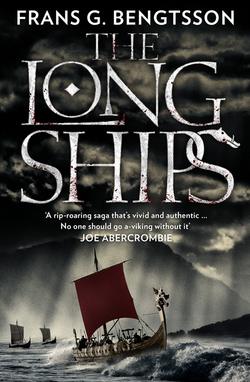Читать книгу The Long Ships: A Saga of the Viking Age - Michael Meyer - Страница 19
CHAPTER NINE How King Harald Bluetooth celebrated Yule
ОглавлениеGreat men from all over the North came to Jellinge to celebrate Yule with King Harald, so that there was less than room enough for them at the tables and in the bedchambers. But Orm and his men did not complain of this overcrowding, for they had received a good price for their slaves, and had sold them all before the festival commenced. When Orm had divided up the proceeds of the sale, his men felt rich and free indeed, and they began to yearn for Lister and to know whether Berse’s two ships had come home, or whether they themselves were the only survivors of Krok’s expedition. However, they offered no objection to staying in Jellinge until the festival was over, for it was regarded as a great honour, and one which added lustre to a man’s name for the rest of his days, to have celebrated Yule with the King of the Danes.
The principal guest was King Harald’s son, King Sven Forkbeard,1 who had arrived from Hedeby with a large following. Like all King Harald’s sons, he was the child of one of his father’s concubines; and there was little love lost between him and his father, so that in general they avoided each other as much as possible. Every Yule, though, King Sven made the journey to Jellinge, and everybody knew why. For it often happened at Yule, when the food was richer and the drink stronger than at any other time in the year, that old men suddenly died, either in bed or on the drinking-bench. This had been the case with old King Gorm, who had lain unconscious for two days after a surfeit of Yuletide pork, and had then died! and King Sven wanted to be near the royal coffers when his father passed over. For many Yules now he had made the journey in vain, and each year his impatience increased. His followers were a rough crew, overbearing and quarrelsome, and it was difficult to keep the peace between them and the men of King Harald’s household, all the more so now that King Harald had turned Christian and many of his men had followed suit. For King Sven still clung to the old religion, and made spiteful mock of his father’s conversion, saying that the Danes would have been spared all this folly if the old man had had the sense to know when he had lived long enough.
However, he did not trumpet his opinions too openly when he was at Jellinge, for King Harald was easily roused to anger, and when this happened he was liable to do anything to anybody. They wasted no words on one another once they had made formal salutation, nor, from their seats of honour in the great hall, did they toast each other more than the conventions of politeness absolutely required.
There was a snowstorm on Christmas Eve, but it passed, and the weather grew calm and cold; and on Christmas morning, while the priests were singing mass and the courtyard of the palace lay shrouded in good steam from the preparations afoot in the kitchens, a great long-ship rowed up from the south and made fast to the pier, its sail tattered and its oars glazed with ice. King Harald was at mass, but they sent a messenger to inform him. Wondering who these new guests could be, he went up the stairs to look at the ship. It was steeply built, with a red dragon’s head poised arrogantly upon a curved neck at the prow, its jaws caked with ice from the cruel seas it had passed through. They saw men climb ashore wearing garments barked with ice, among them a tall chieftain in a blue cloak and another, of equal stature, clothed in red. King Harald scanned them as closely as he could from where he stood, and said: ‘It looks like a Jomsviking, or perhaps a Swedish ship, and it is boldly manned, for its crew approach the King of Danes with no shield of peace upon their masthead. I know of but three men who would dare to come thus: Skoglar-Toste, Vagn Akesson, and Styrbjörn. Moreover, they have brought their ship alongside without removing their dragon-head, though they know well that the trolls of the mainland do not love dragon-heads; and I know of but two men who do not care what the trolls think, and they are Vagn and Styrbjörn. But I see from the ship’s condition that its captain disdained to seek shelter from last night’s storm, and there is but one man who would have refused to bow to such a tempest. It is my guess, therefore, that this must be my son-in-law Styrbjörn, whom I have not seen these four years; one of them wears a blue cloak, moreover, and Styrbjörn has sworn to wear blue until he has won back his inheritance from King Erik. Who this other with him may be, the man who is as tall as he, I cannot surely say; but Strut-Harald’s sons are taller than most men, all three of them, and they are all friends to Styrbjörn. It cannot be Jarl Sigvalde, the eldest of them, for he takes little pleasure in Yule celebrations now, because of the ignominy with which he stained his name when he rowed his ships away from the battle at Jörundfjord; and his brother Hemming is in England. But the third of Strut-Harald’s sons is Thorkel the Tall, and it may be that this is he.’
